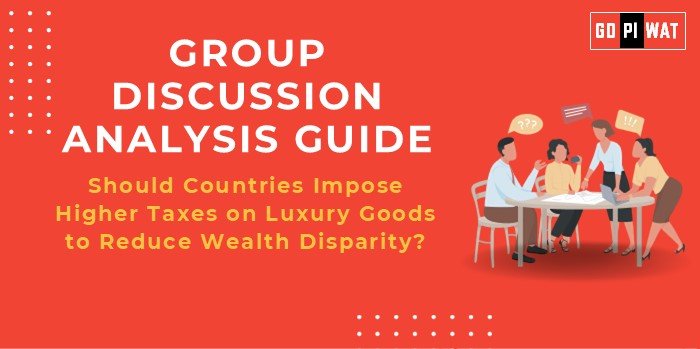📋 Group Discussion Analysis Guide: Should Countries Impose Higher Taxes on Luxury Goods to Reduce Wealth Disparity?
🌐 Introduction
Context Setting: The rising wealth gap in many nations has sparked debates on policy measures to bridge this divide. One such measure is imposing higher taxes on luxury goods, a strategy that targets discretionary spending by the wealthy while potentially redistributing income for social programs.
Background: Luxury taxes have been historically employed as tools for revenue generation and social equity. In recent years, countries like Norway and France have implemented similar measures with varying outcomes. The argument hinges on whether such taxes can genuinely impact wealth disparity or merely alter spending patterns without addressing systemic inequities.
📊 Quick Facts and Key Statistics
- 🌍 Global Wealth Inequality (2023): Top 1% own 46% of global wealth (Oxfam).
- 💎 Luxury Goods Market: Valued at $350 billion globally, growing at 6% annually (Bain & Co).
- 🇳🇴 Norway’s Wealth Tax: Generates $1.8 billion annually, funding universal welfare programs.
- 🇫🇷 France’s Luxury Tax Impact (2017): 18% reduction in luxury goods sales, marginal effect on wealth redistribution.
🧑🤝🧑 Stakeholders and Their Roles
- 🏛️ Governments: Design and implement taxation policies; redistribute revenue for social equity.
- 💼 Luxury Goods Industry: Faces economic implications, including potential demand reduction and innovation challenges.
- 💰 Wealthy Consumers: Alter consumption patterns and explore tax evasion strategies.
- 👥 Citizens: Experience indirect benefits or repercussions through economic shifts and social programs.
🏆 Achievements and Challenges
🎯 Achievements:
- Revenue Generation: France’s luxury tax added €650 million in revenue in its first year.
- Behavioral Changes: Encourages conscious consumption and reduces conspicuous spending.
- Social Benefits: Norway’s wealth tax helps sustain a universal healthcare system.
⚠️ Challenges:
- Ineffectiveness on Wealth Disparity: Luxury taxes affect spending, not wealth accumulation.
- Economic Repercussions: Potential decline in luxury markets, job losses in niche sectors.
- Implementation Complexity: Risk of tax evasion through offshore purchases or grey markets.
🌍 Global Comparisons
- 🇨🇳 China: Increased consumption tax on luxury cars; limited impact due to rising middle-class demand.
- 🇸🇪 Sweden: Progressive wealth taxes integrated with strong welfare programs.
Case Study: India proposed a luxury tax in 2018 on gold and high-end goods but faced significant pushback, limiting adoption.
📋 Structured Arguments for Discussion
- Supporting Stance: “Luxury taxes are a practical tool to generate revenue and promote social equity by reallocating wealth toward public welfare programs.”
- Opposing Stance: “Imposing such taxes is superficial; wealth disparity stems from structural inequalities, not consumption patterns.”
- Balanced Perspective: “Luxury taxes can complement broader economic reforms but are insufficient alone to address wealth disparity.”
💬 Effective Discussion Approaches
- Opening Approaches:
- Begin with data on rising wealth disparity and its implications for social stability.
- Highlight the role of luxury taxes in historical and contemporary contexts.
- Discuss economic theories linking taxation to wealth redistribution.
- Counter-Argument Handling:
- “Luxury taxes are regressive.” → Rebut with evidence of targeted design benefiting lower-income groups.
- “Risk of economic slowdown.” → Cite cases of successful implementations mitigating such risks.
📈 Strategic Analysis of Strengths and Weaknesses
Strengths:
- Revenue potential
- Promotion of equitable consumption
- Incentivizing sustainable behavior
Weaknesses:
- Limited scope for wealth redistribution
- Potential market disruption
Opportunities:
- Use tax revenue to bolster social programs
- Pilot models in emerging economies
Threats:
- Tax evasion
- Adverse effects on employment in luxury sectors
📚 Connecting with B-School Applications
- Real-World Applications: Exploring the impact of fiscal policies on wealth redistribution for finance and public policy projects.
- Sample Interview Questions:
- Evaluate the effectiveness of luxury taxes in addressing social inequality.
- What are the unintended consequences of taxing high-end goods?
- Insights for Students:
- Study policy intersections between taxation and consumer behavior.
- Assess luxury market dynamics under fiscal constraints.


